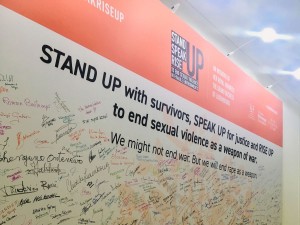REPORT | StandSpeakRiseUP – Ending Sexual Violence in Fragile Environments
Sexual and gender-based violence during armed conflicts is a human rights violation passed on to future generations. For instance, children born of rape in conflict settings face long-term discrimination by law. The StandSpeakRiseUP Conference set out to end rape as a weapon of war – and we need to make this appeal leave the echo chamber of the European Convention Centre in Luxembourg.
A report by Miriam Mona Müller
“Silence is the greatest ally of sexual violence” –
Dr Denis Mukwege, 2018 Nobel Peace Prize laureate
When it comes to rape as a weapon of war and sexual violence in conflicts, perpetrators range from rebels and soldiers to UN troops, and are often not brought to justice. On the one hand, this is due to the fact that survivors tend to stay silent due to fear of social sanctions and being outcasted. On the other hand, collecting evidence during wartime remains a challenge.
Wartime rape has lifelong consequences for survivors and their children. For example, according to Article 9 of the legally binding Convention on the Elimination of All Forms of Discrimination Against Women (CEDAW), a mother has the right to confer her nationality to her children. Nevertheless, states like Syria, Nepal or Togo do not ensure this fundamental right as they only allow fathers to pass on their nationality. For women and girls in conflict settings, this patriarchal system of passing on nationalities is a highly critical issue. When wartime rape results in pregnancy, the biological father in most cases cannot be officially registered in the child’s birth certificate. In countries like Nepal, there is no possibility for a child born of rape to obtain citizenship, which prevents the child from getting adequate access to education or health care. Therefore, it is legitimate to call this practice legal discrimination against survivors of sexual violence as well as children born of rape.
During the StandSpeakRiseUP Conference for ending sexual violence in fragile environments, children born of rape was one key issue. The event was initiated by Maria Teresa, Grand Duchess of Luxembourg. Together with her co-organizers from Mukwege Foundation and the NGO We Are Not Weapons Of War, Maria Teresa organized a survivor-centred forum in Luxembourg on 26-27 March 2019. Activists like the 2018 Nobel Peace Prize laureate Nadia Murad were at the centre stage to stand up for meaningful participation of survivors to fight the culture of impunity. For Murad, „justice is a cure for those who have suffered from sexual and gender-based violence“.
To what extent Maria Teresa’s appeal to end rape as a weapon of war will leave the echo chamber of the European Convention Centre in Luxembourg also depends on whether the high-level decision-makers attending the Conference will speak up. Clare Hutchinson as Special Representative for Women, Peace and Security of NATO, the UN High Commissioner for Human Rights Michelle Bachelet and Special Representative of the Secretary-General on Sexual Violence in Conflict Pramila Patten all emphasized the necessity of a holistic approach in fighting sexual and gender-based violence in armed conflicts. At the moment the UN Office of the Special Representative of the Secretary-General on Sexual Violence in Conflict is working together with the German Permanent Mission in New York on a new UN Security Council Resolution. The resolution builds on previous resolutions and aims to create a mechanism of formal compliance. However, a statement by German civil society organizations clearly recommends a stronger implementation of the current eight resolutions instead of negotiating a ninth one. Civil society’s reservations are based on the resistance of certain UN Security Council member states concerning essential sexual and reproductive rights, including issues related to children born of rape. A new resolution might be used to water down existing language and slow down progress instead of advancing women’s rights in armed conflicts.
Pushing back the pushback was another topic during the Conference session on “Healing the Body”. For panelist Sylvia Acan from Uganda, healing the body is directly connected to healing the mind. Thus, the Ugandan government’s resistance to recognizing sexual and gender-based violence as a valid reason for psychological treatment is a daily struggle for her and other wartime rape survivors. Another panelist, Dr. Monika Hauser from Medica Mondiale, pointed out that restrictive gender norms in health care deny survivors located outside of their country of origin to seek psychological and physical treatment. “This is not just a problem in Africa or the Global South, I can witness the lack of gender sensitivity and pushbacks in Western countries too”, emphasized Dr. Monika Hauser.
Thanks to these vivid discussions, the StandSpeakRiseUp Conference clearly demonstrated the multidimensionality of sexual and gender-based violence in fragile environments and successfully approached the issue from the perspective of survivors. Now it is up to government officials to repeal discriminatory laws that are rooted in patriarchal social norms and discriminate survivors of gender-based violence, and finally pave the way for justice.
April 5, 2019
Miriam Mona Müller is project lead of “Women, Peace and Security: A Chance for Georgia’s and Ukraine’s Protracted Conflicts?“ (2019). She also works at the UN Women National Committee Germany. Miriam focuses on the EU’s external promotion of the Women, Peace and Security agenda, especially when it comes to sexual and gender-based violence. You can follow Miriam on Twitter at @MiriamMonaMue.

